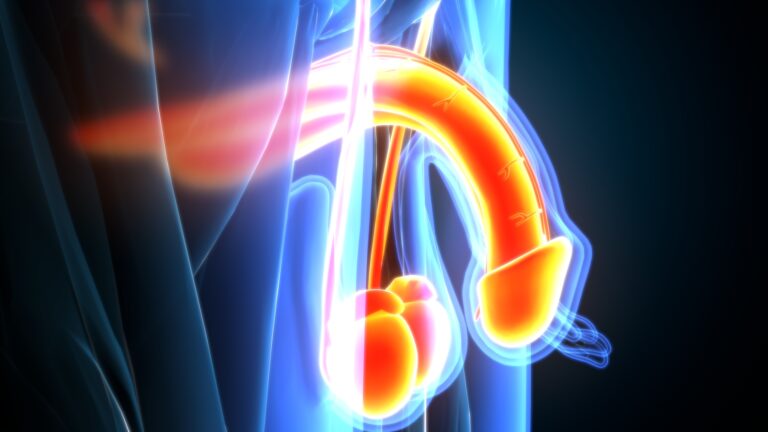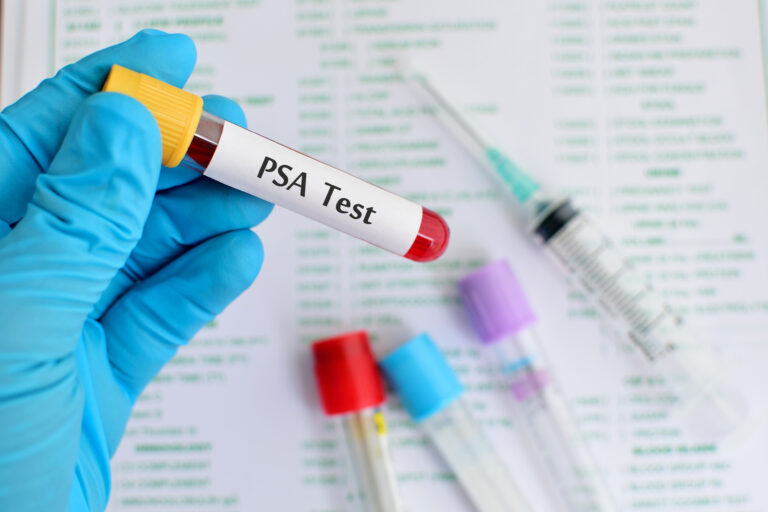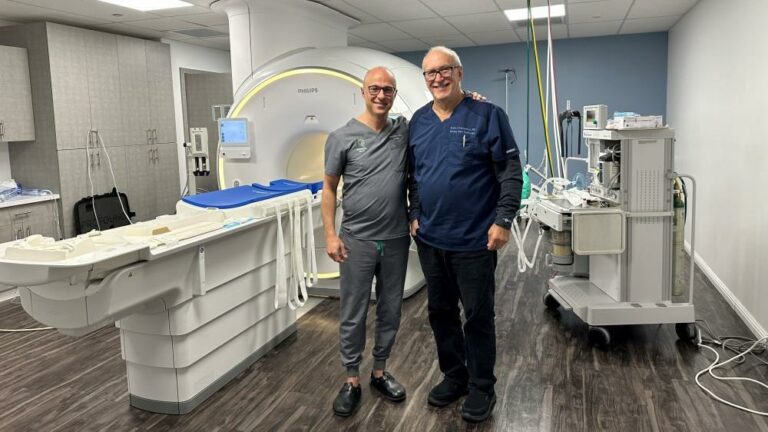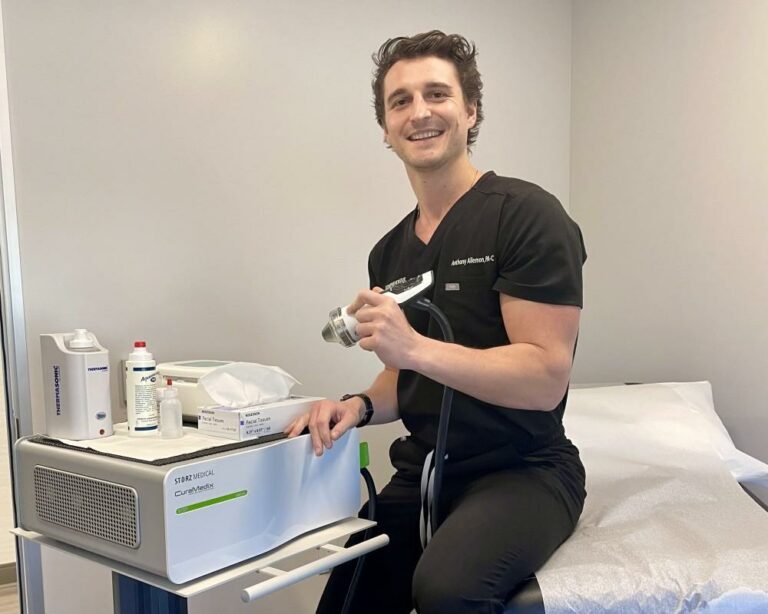What is Vaginal Rejuvenation and is ThermiVA an Effective Alternative to Labiaplasty?

Vaginal Rejuvenation and ThermiVA as an Alternative to Labiaplasty
Comprehensive Urology offers both surgical and non-invasive treatments for a number of issues or reasons. Our office also has non-invasive ThermiVA vaginal rejuvenation, which can benefit those who want to reverse certain health conditions such as vaginal dryness or recurring UTIs or for cosmetic purposes. For more information regarding vaginal rejuvenation and ThermiVA specifically, please contact us or request an appointment online.
Table of Contents
What is vaginal rejuvenation?
Vaginal rejuvenation is a broad term that includes a combination of both surgical and non-invasive treatments. Giving birth and aging can both have an impact on your vagina, often resulting in loss of elasticity and firmness in the surrounding and internal tissues. Many reversible issues arise from these changes, including vaginal dryness, vaginal looseness, incontinence (leaking urine), recurrent infections, and a decrease in sexual pleasure.
Additionally, hormonal changes for women in their 40’s and 50’s can have an impact on the quality of vaginal tissues, contributing in an increase in urinary tract infections (UTI’s) and vaginal infections like yeast infections and common bacterial overgrowth. Many cis women or people assigned female at birth (AFAB) seek vaginal rejuvenation to mitigate these conditions.
Many patients also try vaginal restoration procedures, such as non-invasive ThermiVA® vaginal rejuvenation, to restore the look and feel of their vagina to match their experience of their younger years. Whether your goal is to reverse health conditions associated with childbirth and aging, or you are curious about potential cosmetic benefits, there are both surgical and nonsurgical options for vaginal rejuvenation.
Why do people get vaginal rejuvenation?
Vaginal rejuvenation is commonly performed to address issues associated with giving birth, perimenopause, or menopause. Treatments can improve the following symptoms: vaginal looseness, lack of lubrication, and loss of sexual intimacy. Treatment can help minimize these symptoms as well as:
- Looseness of the skin surrounding the vagina
- Loss of elasticity of labia and internal vaginal walls
- Vaginal dryness
- Painful intercourse
- Urinary incontinence
- Frequent urination
- Decreased libido
- Muted orgasms
- Loss of sensation and sexual satisfaction
- Lack of confidence or a decrease in self-esteem
What are the different types of vaginal rejuvenation?
Vaginal rejuvenation procedures can be surgical or nonsurgical. Treatment can be applied to the vulva (the external part of the female genitals) and the vaginal canal (the internal part where penetration occurs during intercourse). Additionally, a comprehensive approach can be applied where more than one treatment is applied in combination to achieve optimal sexual health.
What are surgical vaginal rejuvenation procedures?
Surgical methods of vaginal rejuvenation typically involve sedation or anesthetics as incisions are made to the vaginal tissues. These procedures are normally performed by your gynecologist or a plastic surgeon that specializes in this type of surgery.
Types vaginal surgeries include cosmetic surgery, like female genital plastic surgery, as well as vaginal reparation from damage during childbirth or from female genital mutilation. The most common surgical procedures for vaginal rejuvenation are:
Labiaplasty: is the surgical reshaping of lips of your vagina (labia)
Vaginoplasty: is a surgery to repairs or tighten the vaginal canal, often used after childbirth.
Clitoral Hood Reduction: is the removes of extra tissue covering the clitoris.
Vulvoplasty: is the surgical reshaping of the vulvar area (external genitalia).
What are non-invasive surgical vaginal rejuvenation treatments?
Nonsurgical vaginal rejuvenation treatments are noninvasive and utilize methods like radio frequency waves (e.g., ThermiVA®) or lasers instead of incisions for vulva and vaginal canal reshaping and repair. These noninvasive approaches are favored due to their minimal side effects and quicker recovery compared to surgical options.
Non-invasive vaginal rejuvenation effectively tightens and tones the vaginal area without needles or surgery. This involves heating the upper layers of vaginal tissue, prompting the creation of additional collagen and firmer tissue in the underlying layers.
Nonsurgical treatment includes:
- Radio Frequency (RF) Treatment: RF treatments, such as ThermiVA®, employ radio frequency waves to enhance blood flow and collagen production in vaginal tissues. These noninvasive treatments result in increased vaginal tightness, improved lubrication, and heightened sensitivity during intercourse. Side effects are rare, and patients can engage in sexual activity on the same day as the treatment.
- CO2 Laser Treatment:
This method uses lasers to heat the outer vaginal tissue layers, encouraging inner layers to generate more collagen for increased vaginal canal firmness. However, laser use may lead to minor scarring and irritation post-treatment. It is crucial to consult with a qualified urologist, gynecologist, or properly trained plastic surgeon when considering vaginal rejuvenation treatments.
What is ThermiVA® Vaginal Rejuvenation?
ThermiVA® is a treatment using radio frequency waves (electromagnetic energy) which was first used to rejuvenate facial skin and then later used as a vaginal rejuvenation technique. ThermiVA® works by stimulating the fibroblasts (growth cells) in the skin to produce more skin cells by promoting the natural production of collagen.
When used inside the vagina, ThermiVA® works to tighten the vaginal walls and to stimulate collagen production in the vaginal tissues. When used externally on the female genitalia, the radio frequency waves tighten the labia (vaginal lips), stimulating the blood vessels and nerve endings. This stimulation encourages new collagen production, which is responsible for making the tissue more elastic and firm, essentially reversing the aging process.
How does ThermiVa work?
ThermiVA® uses targeted radio frequency energy to stimulate natural collagen production, which is the protein inside our skin and membranes that makes our tissues elastic, supple, and youthful. ThermiVA® stimulates the production of new vaginal tissue by activating fibroblasts (growth cells) in the skin and mucosa. It’s effective for external skin, such as on our face and the external lips of the vagina, and is safe and effective for use inside the vagina itself.
Are there any side effects?
Side effects are very rare, and the procedure is performed without sedation or anesthesia. Patients are free to have same-day sex after this outpatient treatment, and often experience immediate results, as ThermiVA® makes the vaginal tissues more plump and firm after the first treatment. For more details regarding ThermiVA® vaginal rejuvenation, please contact Comprehensive Urology in Beverly Hills, CA.
How long is the treatment? How many treatments are required?
ThermiVa is an in-office procedure that takes between 30-45 minutes to complete, with no discomfort or downtime following the procedure. For optimal results, patients should receive a series of three ThermiVA® treatments over the course of three months (one each month). After this initial series of treatments, one or two treatments a year is sufficient to maintain peak results for your vaginal rejuvenation.
What is the recovery like for ThermiVA®?
Most patients report no side effects or discomfort after a ThermiVA® treatment and are free to have sexual intercourse the same day as the treatment. On rare occasions, some women have reported mild symptoms including:
- Mild redness
- Minor swelling
- Some tightness
- Mild discomfort
How long do results of ThermiVA® treatments last?
The initial series of three treatments typically lasts approximately two years for most patients. Depending on the severity of the conditions, some patients may need additional treatments to achieve these same results. Maintenance of optimal sexual health usually needs an additional 1-2 treatments per year for highest quality long-term results. Some patients see sufficient results in 1-2 initial treatments and continue with maintenance treatments 1-2 times annually.
How effective is ThermiVA when compared with surgical labiaplasty?
Comprehensive Urology is currently conducting an observational study to assess the effectiveness of non-invasive ThermiVA® for our patients. Our approach involves individualized care for each patient, ensuring that we tailor the program to meet their specific needs.
We often recommend non-invasive ThermiVA® treatments as the first choice because they typically have minimal to no side effects. These treatments stimulate the body’s natural healing response by increasing blood flow and promoting collagen rejuvenation. While surgeries like labiaplasties can be performed safely, they do carry a higher risk of side effects.
After evaluating your unique situation, Dr. Kia Michel and his team will create a comprehensive treatment plan to optimize your positive outcomes. Approximately 90% of our ThermiVA® patients report satisfaction with their vaginal rejuvenation, making non-invasive treatment a popular choice. However, some cases may necessitate surgical intervention, which can be combined with other treatments, including ThermiVA®.
When Can I Have Sex After My ThermiVA Treatment?
One of the benefits of ThermiVA treatment is that patients can have intercourse the same day of treatment. In contrast, laser therapy requires a recovery time of 5-7 days before sexual activity may resume, and surgical vaginal rejuvenation requires six weeks minimum before intercourse may resume.
What to Expect after One Treatment of ThermiVA
While a full course of ThermiVA treatment is three sessions, some patients experience improvement in vaginal tightness and lubrication after just one session. On average, patients tend to begin seeing results after the second session, and full results after the third treatment. Exact results will vary depending on the severity of symptoms and other factors.
Is ThermiVA covered by insurance?
Most insurance companies consider ThermiVA® an elective procedure, and will not cover the cost of treatment. Please don’t hesitate to contact Comprehensive Urology to discuss payment options.
Do I need to do anything special prior to the treatment?
No preparation is needed prior to treatment. You may preform your normal activities up until treatment time, and resume them immediately afterward. This is one of the many benefits to ThermiVA as opposed to more invasive treatments, which require downtime. In fact, treatment is so quick and easy that some women opt to have their ThermiVA treatment during their lunch break.
Is Non-Surgical Vaginal Rejuvenation Painful?
Among the two most popular non-surgical vaginal rejuvenation procedures, ThermiVA® stands out as the option with the fewest side effects and virtually no scarring risk. The majority of ThermiVA® users experience minimal discomfort and can resume intercourse on the same day as the treatment.
In contrast, laser vaginal rejuvenation treatments, while effective, carry an added risk of scarring due to the intense heat generated by the laser. This risk arises from the considerably higher energy levels used in concentrated laser procedures compared to the milder radio frequency waves of ThermiVA®.
Are energy-based procedures more effective than surgical procedures?
Evaluating whether surgery or non-invasive energy-based treatments like ThermiVA® are best for you requires the evaluation by a licensed urologist or gynecologist. At Comprehensive Urology, we first perform a thorough evaluation of your individual needs before recommending a complete treatment plan.
Based on our success rates with ThermiVA® radio frequency treatments, nearly 90% of our patients have noticeable results after just 1-3 treatments. ThermiVA® activates the body’s natural ability to heal itself by stimulating collagen production. Which option is most effective depends on the severity of symptoms. For women with more severe vaginal looseness, surgical procedures may be more effective. However, the majority of women will find ThermiVA® just as effective, with much less downtime and fewer side effects.
Can I be treated while I have my period or an outbreak of an STD?
While it is possible to perform ThermiVA while on your period, it’s best to wait until your period is over before your ThermiVA treatment. This will help reduce any risk of discomfort during the procedure.
STDs do not disqualify you from treatment; however, please make sure to let your provider know which condition(s) you have, as some will require pre-treatment to prevent symptom flare-ups or discomfort.
Vaginal rejuvenation is a broad term that includes a combination of both surgical and non-invasive treatments. Giving birth and aging can both have an impact on your vagina, often resulting in loss of elasticity and firmness in the surrounding and internal tissues. Many reversible issues arise from these changes, including vaginal dryness, vaginal looseness, incontinence (leaking urine), recurrent infections, and a decrease in sexual pleasure.
Additionally, hormonal changes for women in their 40’s and 50’s can have an impact on the quality of vaginal tissues, contributing in an increase in urinary tract infections (UTI’s) and vaginal infections like yeast infections and common bacterial overgrowth. Many cis women or people assigned female at birth (AFAB) seek vaginal rejuvenation to mitigate these conditions.
Many patients also try vaginal restoration procedures, such as non-invasive ThermiVA® vaginal rejuvenation, to restore the look and feel of their vagina to match their experience of their younger years. Whether your goal is to reverse health conditions associated with childbirth and aging, or you are curious about potential cosmetic benefits, there are both surgical and nonsurgical options for vaginal rejuvenation.









You must be logged in to post a comment.